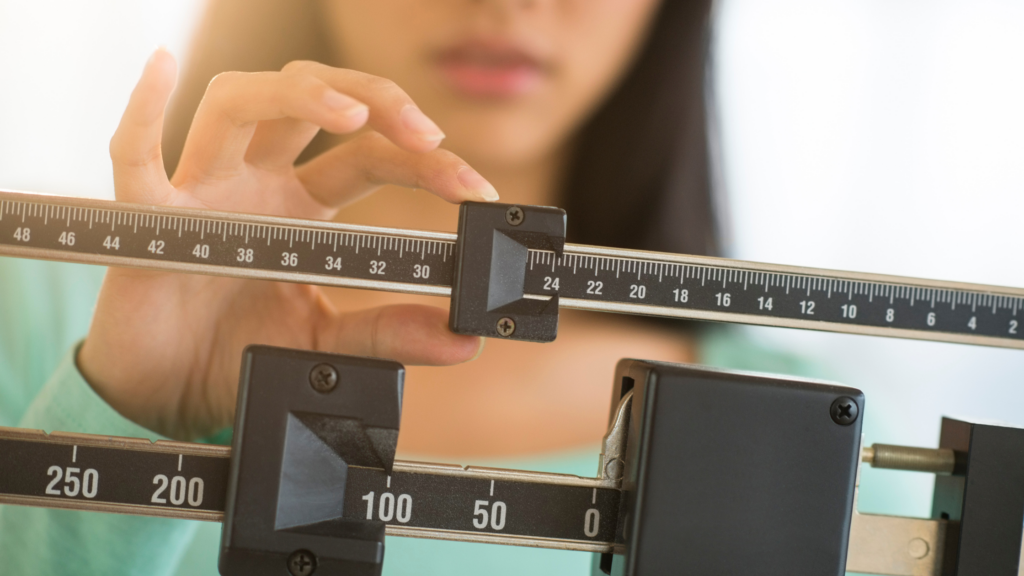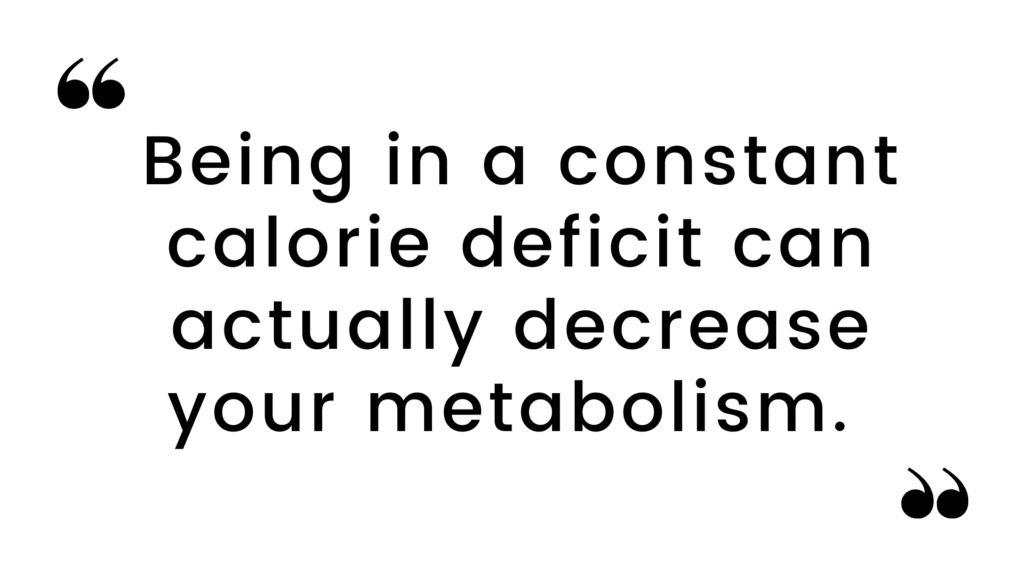
Why the scale isn’t moving

The scale is not moving, HELP!
You’ve been trying to lose weight. You’re eating “clean” and doing all your workouts. You lose the weight…but then it comes to a halt. You start reevaluating and thinking about where you went wrong. Was it because you had a drink with a friend? Do you need to do more cardio? Are you eating too much food? Was it that pizza you ate? You get angry because nothing is working. You throw all your healthy habits out the window because “who cares, it’s not working anyway.” Sound familiar?
It’s frustrating because maybe you’re doing the same things that gave you the initial results but now the scale isn’t budging. I like to tell my clients to throw out the scale or take the batteries out for a month. So first things first, let’s try that out because the scale can be such an inaccurate depiction of where you truly are with your progress. Changes on the scale can reflect water weight, muscle loss, and fat loss. But if you still aren’t seeing any wins there may be explanations to why.
How long has the scale truly not moved or have you not seen progress?
A plateau isn’t just “the scale didn’t move this week.” A true plateau looks like at least 2-3 weeks of nothing changing. Just because you’ve changed your habits doesn’t mean you will automatically start shedding all the weight off daily. In the beginning, you may see weight come off quickly, but that could be water weight or your body is in an initial shock. After that time period, we have to remain consistent to continue with sustainable fat loss.
If you’re truly at a plateau then, yes, let’s reassess what you’re currently doing because there are changes that can be made.
How long have you focused on a calorie deficit?
If you haven’t gone through Metabolism Makeover, then my guess is that your approach has been to count calories and work toward a calorie deficit. However, the method is flawed because when it comes to fat loss, focusing on your blood sugar may arguably be more important than calories. Read more on that here and also read here why calories are stupid.

Being in a constant calorie deficit can actually decrease your metabolism. Initially, yes, you lose weight. But then your body is saying “Wait, hold up. This isn’t enough food, and I need to just survive. Let’s hold on to what they’re eating so I don’t die.” Your body stops caring about weight loss because your body no longer feels safe with the current situation.
If you want to rev up your metabolism, instead of trying to drop even lower in calories and ending up in the same space (tired and hungry), you have to eat. Like real meals with protein, fat, and fiber – not just gum or water or highly-processed pre-measured meals.
Let’s also consider this… were you previously eating highly processed foods and doing low-calorie, no-sugar everything? Now, if you switched up your eating to include fruits, veggies, lean meats, and more whole grains, this takes longer to digest, and you may experience some initial bloating or your body may work to become more regular (AKA needing to poop).
Maybe it’s time to throw in a changeup with what you’re eating or how you’re moving. Swap morning coffee sits for a morning walk and sunshine, juicing each morning for a high-protein breakfast, or maybe your 3-mile jog for a 30-minute lifting session. That over-restrictive diet probably isn’t doing you many favors.
What if you can’t lose weight because you’re so focused on losing weight?
Hang with me here. If you have been hyper-focused on the number on the scale dropping, a few things could be happening. One, you’re missing all the non-scale wins. Non-scale wins look like better digestion, less bloat, clothes fitting better, inches lost, clearer skin, no more feeling hangry, and increased energy.
Two, if you are not losing weight and this is something that is contributing to your stress, you could be increasing your cortisol levels. Cortisol is our stress hormone. We need it, but excess amounts of cortisol can increase hunger, decrease your metabolism, and affect sleep quality.
Instead of focusing on the scale, focus on your meals, strategic workouts, taking rest days, managing your stress, getting adequate amounts of sleep, and working on your mindset toward weight loss. In my opinion, these are much better wins than a number on the scale, plus many of these wins typically lead to fat loss in the long run.
What do your workouts look like?
One of your greatest tools to get off that plateau is to go pick up the weights. Not another high-intensity cardio session but actual weights to help you build muscle. The more muscle mass you have, the more calories you’ll burn sitting here reading this blog post. Fun fact: lean muscle tissue is directly connected to an increased metabolic rate.
A good goal for strength training sessions would be 2-4x/week. If you’re already working out 2 days per week, could you increase it to 3 for a little change-up? Let’s also consider what your workouts look like. Are they random or are you following a progressive overload program? Progressive overload programs will help to give you more consistent results for building muscle.
On the flip side… are you working out too much? You need rest days! 2 rest days a week is generally sufficient, but this doesn’t mean you have to be a couch potato on those days, just do less stressful types of movement like going on a walk or getting in some yoga. If you’re not taking rest days, you’re likely overtraining, which can lead to fatigue, weight loss resistance, and poor sleep quality. So, if we really want to build muscle, we have to give our muscles time to rebuild after they are broken down in a workout.
Outside of your workouts, are you moving your body enough throughout the day or are you pretty sedentary? Attempt to move your body each hour. Not only will this decrease the effects of a sedentary lifestyle, but it will also give you a midday energy boost your body may need.
Are you sleeping 7-9 hours per night?
Yes, you need sleep even if you can “function on 4 hours and coffee.” This isn’t cutting it. When you’re sleeping, you’re producing leptin and ghrelin, which are our hunger and satiety hormones. In fact, studies show that those who don’t get adequate sleep consume over 300 extra calories per day. On top of lack of sleep leading to dysregulation of your hunger and satiety hormones, you may actually be putting more stress on your body. Plus, if you’re covering the lack of sleep with caffeine, that’s a double whammy of stressors.
Do you need to get real with yourself?
Take a step back and evaluate. How often are you eating dessert? What do your weekends look like? Are you throwing everything out the window with alcohol, pizza, and donuts being your staple meals? Don’t get me wrong, I love a Friday night pizza, but you can make it more PHFF-friendly!
If you’re new here, we are big fans of PHFF meals. Why? Protein, healthy fat, and fiber are very good at balancing your blood sugar by slowing the uptake of sugar into the blood and minimizing spikes and dips. Personally, I’ll just do a side salad because most pizza places will have that available to order. Pizza is not a meal but pizza with some veggies and extra protein is. Donuts are not breakfast but a donut with an omelet would be more blood sugar friendly.
Saving your calories for alcohol isn’t your best idea either, sorry. Get in a full meal before your night out!
Still feel like you’re doing well? Okay – have you checked in with your hormones?
If you’ve had months of consistency and doing all the things and are still stuck, it may be time to look a little deeper. When I say deeper I am talking about thyroid health, figuring out if you’re having any food intolerances, getting some labs done, etc.
If you have been stuck on a plateau for weeks, I hope you find some of these tips helpful to give you the change-up you need. If you want to learn more about getting off your plateau and getting away from the diet cycle, join me for your Metabolism Makeover!
Catch up with me on IG @nucrewnutrition!
– Baylee Reller, Metabolism Makeover Coach

